THE LIVING TAO : TIMELESS WISDOM FOR THE MODERN WORLD
This is a podcast dedicated to exploring the profound, yet elusive True Tao (真道). Acknowledging that the essence of Tao is beyond traditional discourse and expression, this series seeks to demystify Taoist principles and adapt them for contemporary listeners. Each episode offers a blend of ancient wisdom and modern insights, providing practical guidance for navigating the complexities of today’s world. Whether you’re a seasoned practitioner or new to the path, join us in discovering how the timeless wisdom of Tao can be lived out in the here and now.
Episodes
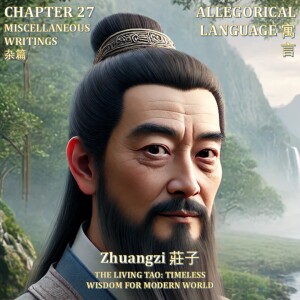
Thursday Nov 21, 2024
Thursday Nov 21, 2024
The Chapter presents excerpts from Zhuangzi's Zhuangzi, specifically Chapter 27 on allegorical language. It explores three types of expression—parables, indirect statements, and spontaneous utterances—highlighting their role in achieving harmony with the natural world. The excerpts feature dialogues illustrating the limitations of fixed beliefs and the importance of fluidity in thought and perception, emphasizing the interconnectedness of all things. Through various anecdotes, the text advocates for embracing spontaneity and transcending rigid notions of right and wrong to achieve a deeper understanding of existence. Ultimately, it promotes a philosophical approach that aligns with the natural order, moving beyond the constraints of conventional language and thought.
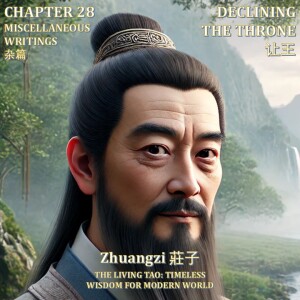
Thursday Nov 21, 2024
Thursday Nov 21, 2024
The Chapter presents excerpts from the Zhuangzi, focusing on numerous anecdotes illustrating the Daoist ideal of prioritizing inner peace and self-cultivation over worldly power and possessions. Several figures, offered the chance to rule, decline, highlighting the insignificance of external achievements compared to internal harmony. The passages emphasize the importance of aligning oneself with the Dao, rejecting the pursuit of wealth and status if it compromises one's integrity or well-being. Ultimately, the text contrasts those who value life and inner peace with those who prioritize worldly ambition, often to their detriment.
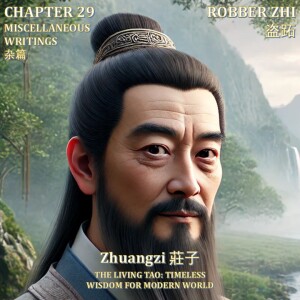
Thursday Nov 21, 2024
Thursday Nov 21, 2024
The Chapter recounts a meeting between Confucius and the bandit Dao Zhi. Confucius, attempting to reform Dao Zhi, presents arguments based on morality and societal order. Dao Zhi, however, rejects Confucius's philosophy, countering with a critique of societal structures and the pursuit of power. The narrative highlights a clash between Confucian ideals and a pragmatic, arguably nihilistic, worldview. The ensuing dialogue explores the nature of virtue, leadership, and the consequences of ambition.
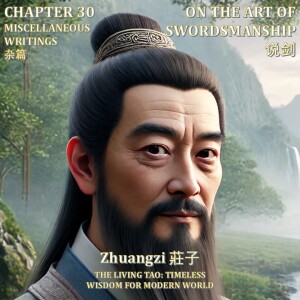
Thursday Nov 21, 2024
Thursday Nov 21, 2024
The Chapter recounts a story from the Zhuangzi where Zhuangzi, a renowned philosopher, is summoned to dissuade King Wen of Zhao from his obsessive passion for swordsmanship. Zhuangzi cleverly avoids a direct confrontation, instead using a metaphorical discussion of three types of swords—the Son of Heaven's, the noble lords', and the common people's—to subtly reveal the king's flawed priorities and the inappropriateness of his preoccupation. Ultimately, Zhuangzi's wisdom leads the king to abandon his dangerous and unproductive obsession, highlighting the importance of leadership, virtue, and the effective use of rhetoric. The story serves as an allegory for the dangers of misplaced priorities and the power of insightful discourse.
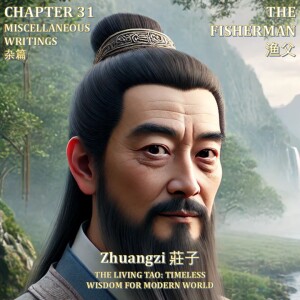
Thursday Nov 21, 2024
Thursday Nov 21, 2024
Zhuangzi's "The Fisherman" recounts a meeting between Confucius and a humble fisherman. The fisherman criticizes Confucius's focus on social rituals and worldly affairs, arguing that true understanding comes from aligning oneself with the Dao (the Way). The encounter highlights the contrast between Confucian social ethics and the Taoist emphasis on natural spontaneity and inner cultivation. The fisherman's teachings stress sincerity, self-cultivation, and avoiding eight flaws and four hazards to achieve harmony with the Dao. Ultimately, the story explores the different paths to enlightenment offered by Confucianism and Taoism.
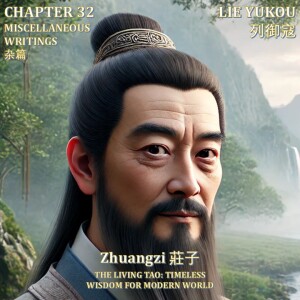
Thursday Nov 21, 2024
Thursday Nov 21, 2024
This Chapter from Zhuangzi's Miscellaneous Writings chapter, "Lie Yukou," presents a dialogue between Lie Yukou and Bo Hun Wuren exploring Taoist principles. Lie Yukou's unease at receiving unexpected kindness highlights the anxieties of worldly recognition. Bo Hun Wuren counters with the Taoist ideal of naturalness and detachment, emphasizing the importance of inner sincerity over external validation. The subsequent anecdotes further illustrate the pitfalls of seeking approval and the rewards of aligning with the natural order, culminating in Zhuangzi's own reflections on death and the futility of worldly ambition.
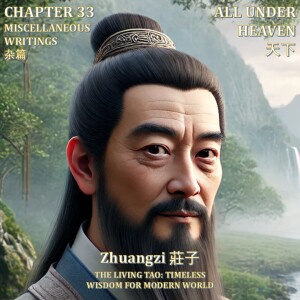
Thursday Nov 21, 2024
Thursday Nov 21, 2024
Zhuangzi's "All Under Heaven" chapter explores diverse ancient Chinese philosophical schools, contrasting their approaches to the Dao (Way). It examines various perspectives on achieving harmony, from strict austerity and self-cultivation to effortless yielding and embracing paradox. The chapter highlights the limitations of individual schools, emphasizing the importance of understanding the Dao's holistic and all-encompassing nature. Ultimately, it critiques the fragmentation of wisdom, advocating for a return to a unified and comprehensive understanding of the Way.
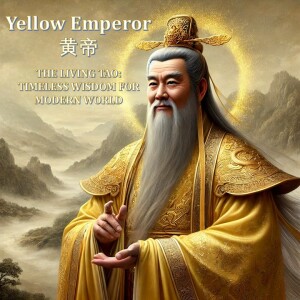
Monday Nov 25, 2024
Monday Nov 25, 2024
About 黄帝 Huangdi (The Yellow Emperor)
The Yellow Emperor is said to have reigned during China's mythological Golden Age and is credited with various inventions and cultural advancements, including the foundation of traditional Chinese medicine.
While historians debate the Yellow Emperor's historical existence, he has become an archetype of sage-like wisdom.
In The Yellow Emperor’s Classic of Internal Medicine, Huangdi serves as the primary figure, engaging in dialogues with his ministers and advisors to explore medical principles, disease prevention, and the mysteries of life and health.
The text is framed as a conversation between Huangdi and his ministers, providing both a philosophical and practical approach to medicine.
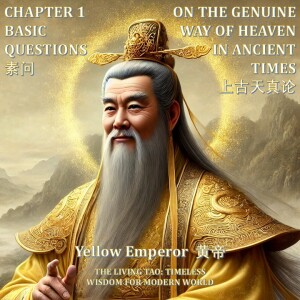
Monday Nov 25, 2024
Monday Nov 25, 2024
The Book: 黄帝内经 The Yellow Emperor’s Classic of Internal Medicine
The 黄帝内经 (Huangdi Neijing), known in English as The Yellow Emperor’s Classic of Internal Medicine, is a foundational text in traditional Chinese medicine (TCM), dating back over two millennia.
It is attributed to 黄帝 (Huangdi), the legendary Yellow Emperor, who is a mythical figure considered to be one of the ancient Five Emperors and a cultural hero in Chinese mythology.
The Yellow Emperor is often revered as a forefather of Chinese civilization and a symbol of wisdom and insight, particularly in relation to health, medicine, and natural philosophy.
The Yellow Emperor’s Classic of Internal Medicine is generally divided into two main sections: the 素问 (Suwen or Basic Questions) and the 灵枢 (Lingshu or Spiritual Pivot).
The Suwen covers general theories of health, diagnosis, and treatment, while the Lingshu focuses more on acupuncture techniques and the principles of qi (energy) flow within the body.
The Suwen (Basic Questions):
This section deals with the fundamental concepts of health, disease, diagnosis, and treatment.
It explains the concept of yin and yang, the five elements (wood, fire, earth, metal, water), and how these elements influence the human body and the cosmos.
It also emphasizes preventive medicine, suggesting that the best way to maintain health is to live in harmony with nature and balance one’s lifestyle.
The Lingshu (Spiritual Pivot):
The Lingshu is sometimes considered an accompanying volume to the Suwen and delves deeply into acupuncture and its role in the body’s energy system.
It describes channels and meridians, points for treatment, and methods to stimulate or balance qi to restore health.
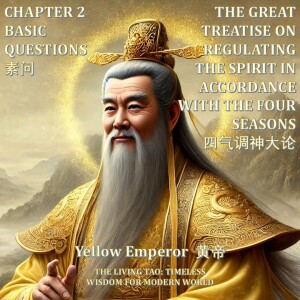
Monday Nov 25, 2024
Monday Nov 25, 2024
This Chapter is an excerpt from the Yellow Emperor's Classic of Internal Medicine, specifically the "Great Treatise on Regulating the Spirit in Accordance with the Four Seasons." It details a philosophy of health and well-being based on aligning oneself with the natural rhythms of the four seasons. Each season is associated with specific organs, energies (yin and yang), and behavioral recommendations to maintain balance and prevent illness. The text emphasizes preventative care, highlighting the importance of living in harmony with nature to avoid disease. Failure to follow these principles is presented as leading to imbalances and health problems.

The Living Tao
Welcome to The Living Tao: Timeless Wisdom for the Modern World—your guide to living a life of balance, wisdom, and inner peace. Inspired by the profound teachings of ancient masters, this podcast explores the enduring relevance of these timeless insights in today’s fast-paced world.
Taoist teachings emphasize living in harmony with the natural flow of life—the Tao, or "the Way." This philosophy invites us to embrace simplicity, cultivate humility, and find peace by aligning ourselves with the rhythms of the universe. At its heart, Taoism encourages us to let go of resistance, shed the distractions of ego, and discover the profound serenity that comes from living authentically and in tune with our true nature.
The Tao Te Ching, attributed to Laozi, is one of the most influential texts in Taoism and serves as a cornerstone of our discussions. Its poetic verses guide us to reflect on themes like balance, self-awareness, and effortless action, or wu wei. These teachings are not bound by time or culture—they resonate just as powerfully today, offering insights that help us navigate the complexities of modern life with grace and equanimity.
Each episode of The Living Tao will uncover practical wisdom rooted in these ancient teachings, presenting it in ways that are both accessible and transformative. Whether it's understanding the art of stillness in a world of constant movement, finding clarity amid chaos, or exploring the paradoxes of strength through softness, you’ll discover tools and perspectives to enrich your life and deepen your connection to the world around you.
Whether you're a seasoned practitioner familiar with the Taoist path or a newcomer drawn to its gentle yet profound philosophy, this podcast offers something for everyone. Together, we'll explore how these age-old principles can help us embrace change, cultivate mindfulness, and find a sense of purpose and inner peace in the face of life's challenges.
Join us on this journey of self-discovery, as we bring the wisdom of the Tao into the present moment. Let the timeless truths of this ancient tradition inspire and empower you to live a more harmonious and enlightened life. Tune in, reflect, and allow the teachings of The Living Tao to guide you back to the essence of who you are.








